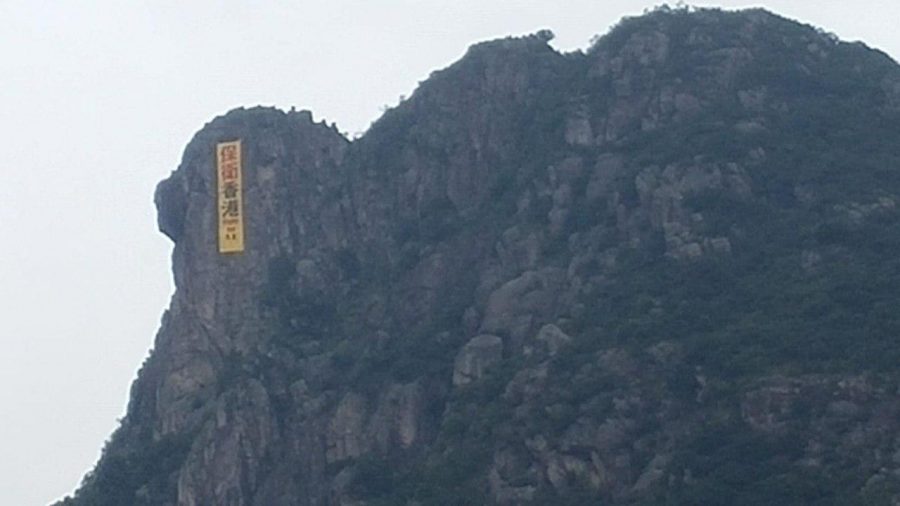A symbolic image reminiscent of the days during the 2014 Umbrella Movement is making a reappearance in Hong Kong.
A long yellow banner with the words “Defend Hong Kong” in Chinese and “Fight for HK” in English was hung from Lion Rock in Kowloon, Hong Kong, on the morning on June 16.
Lion Rock, standing at 495 meters above Kowloon, has the shape of a crouching tiger. It is the most iconic peak in Hong Kong.
It is not known who is responsible for putting up the yellow banner, but it is to show support for the ongoing protests in Hong Kong against an extradition bill introduced by the legislature’s pro-Beijing leader Carrie Lam.
In 2014, protesters calling for universal suffrage for Hong Kongers camped out on the streets of the city’s main business district in Central for almost 3 months. At that time, yellow banners with the words “I want real universal suffrage” in Chinese were also hung from Lion Rock.
Hong Kong media reported that local firefighters were called to remove the yellow banner from Lion Rock at around noon on June 16.

Public broadcaster RTHK also reported that a smaller “Defend Hong Kong” banner had been hung from a hillside in Quarry Bay.
Lam in Precarious Position
Lam suddenly announced on June 15 that she was “indefinitely” postponing the extradition bill after previously playing down such suggestions.
Hong Kong’s self-styled Iron Lady had cracked.
She told a news conference she felt “deep sorrow and regret that the deficiencies in our work and various other factors have stirred up substantial controversies and disputes in society.”
But what could have possibly led to such an inconsistent policy retreat?
Just days earlier, Lam had stressed the need for the extradition law to help solve the murder of a Hong Kong woman in Taiwan, despite widespread worries that the bill would impact on Hong Kong’s international standing as a financial hub with a respected legal system.
Clues to the catalyst for the about-face may lie in a reported meeting between Lam and China’s Vice-Premier Han Zheng.
According to Hong Kong’s Sing Tao newspaper, Lam had a clandestine emergency meeting with Han, a member of the Politburo’s seven-person Standing Committee, China’s top decision-making body, across the border in Shenzhen on June 13.
The content of the meeting is unknown. Lam on June 15 refused to confirm or deny that it had taken place, despite repeated questions.
Beijing Backdown
Beijing’s grip over Hong Kong has intensified markedly since the time Chinese leader Xi Jinping took power in 2012, and after the city’s protracted 2014 pro-democracy street protests.
He warned in 2017 that any attempts to undermine Chinese sovereignty were a “red line” that Beijing would not allow to be crossed—warnings that reinforced his strongman image amongst Hong Kongers.
Many politicians, diplomats, and analysts had not expected Beijing to allow any backdown on the bill, unlike in 2003 when contentious national security laws were scrapped after half a million people took to the streets.
But a source in Beijing with ties to China’s leadership who meets regularly with senior officials, said the Hong Kong government had handled the extradition saga badly.
And while a backdown from Beijing on the bill seemed near inconceivable just a week ago, the violence and escalating unrest forced their hand.
“The outcome doesn’t bear thinking about if this situation wasn’t turned around,” the source said, also declining to be named given the sensitivity of the matter.
The source added that Beijing now had severe doubts about Lam’s capabilities. China’s State Council and the central government’s liaison office in Hong Kong did not immediately respond to Reuters requests for comment.
Steve Tsang, a London-based political scientist, said Lam had caused Xi “major embarrassment” at a time that is not helpful for him, given trade tensions with the United States, and ahead of a possible meeting with U.S. president Donald Trump at the month’s end at the G20 summit in Japan.
Retired senior Hong Kong government official Joseph Wong said he was shocked by Beijing’s U-turn, but the situation had become so untenable that he believed it had led to a recalculation by Han after meeting Lam in Shenzhen.
“I suspect … he (Han) would have had to consider, are we prepared to continue to fire rubber bullets or even real bullets in order to get this through, and what would be the implications for the central government internationally, vis-a-vis the U.S. So that protest was the turning point.”
Lam has refused calls from the opposition and protestors to step down but her ability to govern has been questioned on numerous fronts, including her failure to gauge the pulse in Hong Kong, the broader U.S.-China relationship, and Taiwan’s refusal to accept any extradition bill, undermining her core argument the bill would resolve the Taiwan murder case.
Political scientist Tsang said he did not expect Lam to last much longer as leader.
“I think Carrie Lam’s days are numbered…Beijing cannot afford to sack her right away because that would be an indication of weakness. They would have to allow for a bit of decent interlude.”
Two former post-colonial leaders, Tung Chee-Hwa and Leung Chun-ying, were forced to truncate their terms of office from various controversies linked to policies that stoked fears of Chinese encroachment on the city’s freedoms.
For her part, Lam has asked for time so that the bill can be properly deliberated.
“Give us another chance and we will do this thing well,” she told Saturday’s news conference.
Asked about China’s leaders, she said: “They have confidence in my judgment and they support me.”
With reporting from Reuters.


